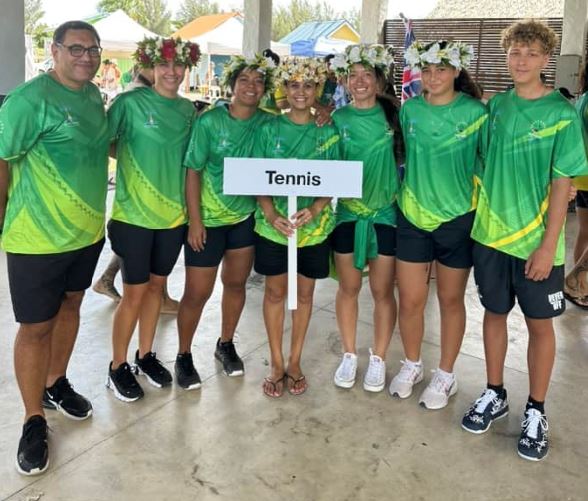Pacific Games: From 1963 to 2023 – a brief history
Saturday 18 November 2023 | Written by Supplied | Published in Pacific Games, Sports

Tennis Cook Islands players have started their Pacific Games campaign. SUPPLIED/23111805
What are the Pacific Games? Which team has won most medals in the Pacific Games? How have Australia and New Zealand performed at the Pacific Games? These questions and more answered in this brief history of the Pacific Games.
The Sol2023 Pacific Games take place in the Solomon Islands from 19 November to 2 December this year, marking the 17th edition of the Games first held in 1963.
It's the first time the country has hosted the top regional Games for countries and territories in the western and southern Pacific Ocean, although it did host the inaugural Pacific Mini Games in 1981 – more on that later.
But who takes part in the Pacific Games? Which team has won most medals in the Pacific Games? How have Australia and New Zealand performed at the Pacific Games? Here's a brief history of the event.
What are the Pacific Games and how did they start?
The Pacific Games were originated as the South Pacific Games in 1959 by the inter-governmental South Pacific Commission, as a means to strengthen bonds between Pacific islands and nations through sport.
Suva, Fiji, held the inaugural Games in 1963 and they were originally staged at irregular intervals, with subsequent editions in 1966, 1969, and 1971. Since then, it has been held on a four-yearly rotation.
It is organised by the Pacific Games Council, a collection of sports organisations representing 22 different countries and territories. Some of these territories do not have fully-fledged National Olympic Committees (NOCs), meaning the Pacific Games and its associated events are the only times these teams compete internationally.
The Games were renamed from the South Pacific Games to the Pacific Games beginning with the 2007 edition in Apia, Samoa.
Which countries and territories are part of the Pacific Games?
There are 22 members of the Pacific Games Council (PGC), 15 of whom are countries and territories fully affiliated to the Oceania National Olympic Committees (ONOC), the continental body for NOCs. The other seven have territorial sports organisations that are part of the PGC and associate members of ONOC.
They are: American Samoa, Cook Islands, the Federated States of Micronesia, Fiji, Guam, Kiribati, Marshall Islands, Nauru, New Caledonia, Niue, Norfolk Island, Northern Mariana Islands, Palau, Papua New Guinea, Samoa, Solomon Islands, Tahiti, Tokelau, Tonga, Tuvalu, Vanuatu, and Wallis and Futuna.
Australia and New Zealand are part of ONOC but not part of the PGC and, due to fears the two sporting powerhouses would dominate, did not compete at the Pacific Games until admitted in 2015 as invitational teams. Both countries participated in 2019 and will also take part this year. They tend to send smaller delegations to avoid dominating the events.
Which team has won most medals in the Pacific Games?
Perhaps surprisingly, the top teams in the Pacific Games' history do not compete at the Olympic Games. New Caledonia and Tahiti (French Polynesia), which are both French overseas collectivities, sit at the top of the list of gold medals won.
Papua New Guinea and Fiji are third and fourth on the all-time list respectively, having also competed in all 16 previous Pacific Games editions.
Which sports have been contested in Pacific Games history?
The Pacific Games has a cap of 24 sports in each edition comprising 17 'core' sports plus up to seven from 20 optional sports.
Archery, athletics, basketball, boxing, canoeing, football, golf, judo, rugby sevens, sailing, aquatics (swimming), table tennis, taekwondo, tennis, triathlon, volleyball, and weightlifting are the current 'core' sports, of which six (athletics, basketball, boxing, table tennis, tennis, and volleyball) have been contested at all 16 prior Pacific Games.
Football (except 1999), swimming (except 1983), and weightlifting (except 1963) have each made 15 appearances before 2023, while golf has been held 14 times (except 1963 and 1966).
In 2023, 27 disciplines will be contested across the 24 sports, with two disciplines in basketball (3X3 and five-on-five), va’a canoeing (va’a and kayak), and volleyball (beach and indoor).
Parasport events are contested under the same banner as the able-bodied events.
How have Australia and New Zealand performed at the Pacific Games?
Australia and New Zealand have competed in just two Pacific Games to date, 2015 and 2019, as guest teams. Sol2023 will be the third appearance for both teams.
To avoid dominating the competitions, both countries have traditionally sent smaller delegations, sometimes composed of athletes slightly below the top international level.
In 2015, the two teams competed in only sailing, taekwondo, rugby sevens, and weightlifting, sending just 92 athletes between them. New Zealand also took part in men's football, with the tournament doubling as an Olympic qualifier for Rio 2016, but did not make the semi-finals despite winning their group.
Australia won 47 medals including 17 gold, with the Kiwis clinching just one gold out of 20 medals.
In 2019, Australia entered six sports: athletics, beach volleyball, rugby sevens, sailing, taekwondo, and weightlifting; New Zealand entered five: archery, athletics, football, taekwondo, and weightlifting.
Australia won 33 gold and 56 total medals, while New Zealand picked up 25 medals including eight gold.
- Olympic.com














































